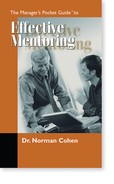8. I suggest to employees who indicate concerns about serious emotional or psychological problems that they
*meet with a counselor responsible for assisting employees
*consult with a professional outside the workplace.
16. I point out inconsistencies (rationalizations) in employees’ explanations of why their job performance and career goals were not achieved if I believe my comments will help them to
*develop better coping strategies to deal with their problems.
18. I explain to employees why they should share (even suggesting someone other than myself) significant work-related problems they are presently confronted with
*even if they prefer not to directly deal with these issues.
21. I tell employees when I think their ideas about career or educational concerns are very clearly based on incomplete or inaccurate information regarding such topics as
*promotional opportunity
*entry into a different job
*future training
*degree requirements.
27. I guide employees through a review of personal experiences and specific facts they are using to base their ideas and beliefs on, especially with regard to important topics such as their
*career options
*individual views about the purpose of education.
31. I point out, using personal examples as well as anecdotes about other employees, that career achievement is primarily based on personal commitment and planning rather than just “luck,” especially to those employees having problems completing all of their job projects, training, or educational assignments, but who still appear
*unrealistic about the amount of discipline and energy needed to cope with the pressures of contemporary career advancement.
33. I confront employees with the reality of continued or probable negative consequences in a direct but supportive manner when they
*repeatedly do not follow-through on their stated intentions to deal with serious job and career-related problems.
37. I offer employees constructive criticism if I believe their avoidance of problems and decisions is clearly limiting their
*work performance
*career potential.
43. I offer comments to employees about what appears to be their own inappropriate or ineffective behavior at work (based on their own explanations and descriptions) if I have a reasonable expectation that they
*are prepared to work on positive change
*will most likely experience some success as a result.
46. I question employees’ decisions and actions regarding past and current work-related issues and problems when they do not appear to have
*formulated or implemented appropriate solutions.
48. I offer as few carefully chosen criticisms as possible when I try to get employees to understand the often difficult to accept connection between their
*own self-limiting (defeating) behaviors and their inability to solve a particular work-related problem.
51. I base the timing (often related to the stage of our relationship) of my “confrontive” questions and comments on my knowledge of the employee’s individual readiness to
*benefit from discussions about clearly sensitive work-related issues.
